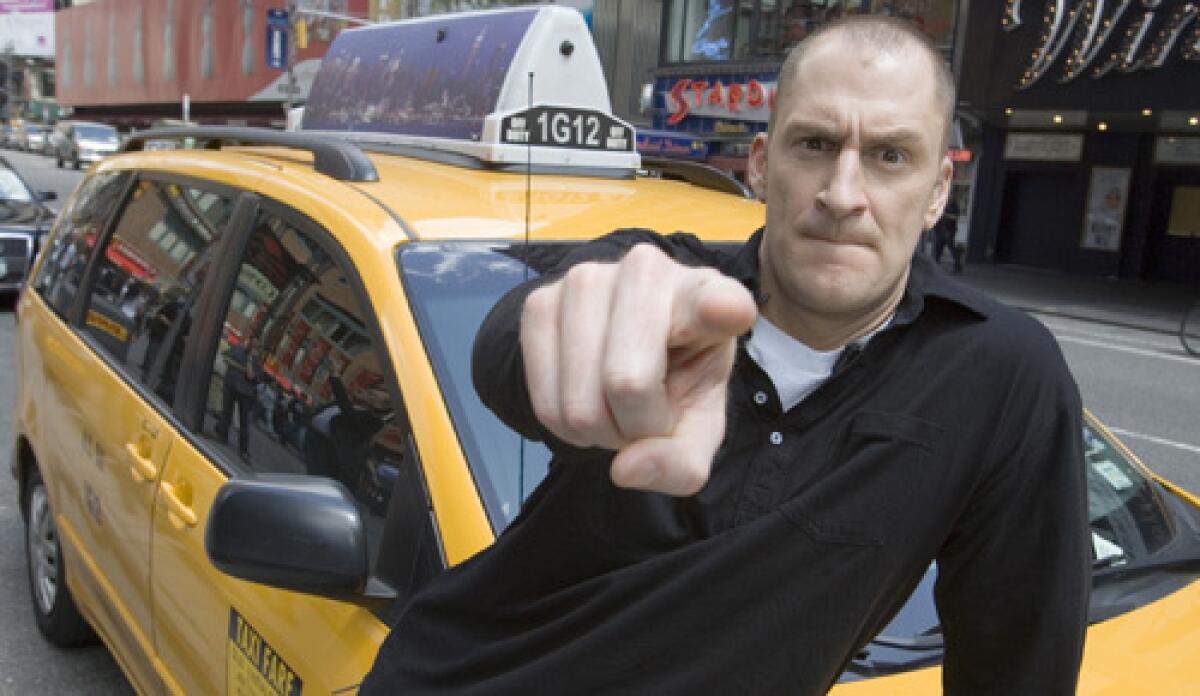‘Cash Cab’ won’t take contestants for a ride

THERE ARE 13,000 cabs in New York City. Only one has a game show inside.
Discovery Channel’s “Cash Cab” is a back-to-basics quiz program that invites unsuspecting passengers to buckle up and play along, paying hard cash to answer not-so-hard questions on the way to their destination.
It’s not the weirdest thing to happen in the back seat of a moving taxi on its way across Manhattan, but enough to get a season pass on my TiVo.
Higher-profile game shows have become about enormous, once-in-a-lifetime payouts, littered with contestants seemingly chosen for their borderline personality disorders -- all eager to do and/or reveal anything to win. The money is their motivation, but what these people really want to win is our attention.
The most anyone’s ever won on “Cash Cab” is $4,100, and the show succeeds because of its modesty -- both financial and personal.
There is no “moment of truth” about recording sexual conquests into columns on a spreadsheet; there are no “deals” that nab your 8-year-old daughter a pony; and absolutely no one cares if you’re “smarter than a fifth grader” (no peeking or cheating allowed).
On “Cash Cab,” the contestants are random -- quite literally picked up off the street, already on their way somewhere else.
A woman with an Eye of Ra tattoo (and matching eye makeup) goes to the Metropolitan Museum; a dad takes his young daughter and her Hello Kitty knapsack to the sitter on his way to work; two hipsters sip Starbucks on their way to meet a friend Uptown, for coffee.
These passengers are real people -- even in the context of non-scripted programming. Most are more surprised that the basic cable show exists than by the “Cash Cab’s” blinking, disco-light ceiling.
Questions are asked, answers are given. It’s as simple as that.
The lack of intimate details is refreshing, and “Cash Cab’s” 3rd Avenue fare to Union Square turns out to be just as revealing as any booze-fueled episode of “Taxicab Confessions.”
Validation came in April, when “Cash Cab” -- a British import now in its fourth season -- won the 2008 Daytime Emmy for outstanding game show, beating out “The Price Is Right” and “Jeopardy.”
Discovery is better known for the testosterone-fueled man-fare of “Deadliest Catch,” “Verminators” and “Shark Week.” So “Cash Cab” might seem an odd addition -- certainly a safer, less visceral experience than the documentary footage of rat and roach infestations, swinging 900-pound metal pots of just-caught crab, and the deadly maws and jaws of the deep blue sea. It is the network’s only game show. But the producers chart the urban jungle of Manhattan with smart graphics, and the questions are rooted in history, geography and the animal kingdom -- the same Trivial Pursuit topics that Discovery viewers love. (“Cash Cab” airs several times a day, weeknights at 6 and 6:30, and in the morning as well.)
Your Cash Cabbie is Ben Bailey, an affable stand-up comic and Travis Bickle doppelgänger. He passed the state exam to become a licensed New York cab driver, but Bailey’s not a hack -- he gets the show’s “general knowledge” questions through an earpiece and has to engage the players, check his rear-view mirror, and navigate New York City traffic at the same time. Let’s see Jim Ignatowski multi-task like that.
The rules, à la “Who Wants to Be a Millionaire,” involve tiers of questions at $25, $50 and $100 dollars each, getting more difficult as the cash values increase. If you have a pulse, watch “The Daily Show” and check your Yahoo homepage regularly, chances are you’re going to win something. Most contestants exit with between $900 and $2,000.
Not bad for 40 blocks.
“Cash Cab” is a fun, supportive place -- but the truth is, the show needs you to win. Or at least have a chance. You can’t surprise somebody, offer them money, then make them feel like an idiot.
After watching about half of the show’s 80 episodes, I started to get a (subtle) sense that the producers match questions to the contestants, to better ensure a winning outcome. That’s not a scandal -- and other shows probably do the same thing -- but three of the seven questions answered by a British contestant on his way to the Russian Tea Room involved the V.A.T. tax (it stands for value-added tax), naming the Russian sub that went down in the Barents Sea in 2000 (the Kursk) and the old English term for lawyer (barrister).
If you do get the wrong answer, the “three strikes” rule applies. Bailey pulls the cab over and lets you off at the curb, regardless of the time of day or weather conditions. Harsh treatment, but not as scary as it sounds. Have you seen the city lately?
Win or lose, “Cash Cab” is good fun -- and contestants exit the taxi with a smile. And you don’t have to tip the driver.
Who said there’s no such thing as a free ride?
More to Read
The biggest entertainment stories
Get our big stories about Hollywood, film, television, music, arts, culture and more right in your inbox as soon as they publish.
You may occasionally receive promotional content from the Los Angeles Times.





